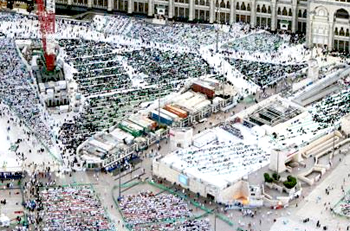 Jeddah, Jul 23: Authorities at Makkah and Madinah have reported a lower-than-expected turnout of worshippers who have registered for “itikaf” (total seclusion) at the Grand Mosque and Prophet’s Mosque. Thousands of Muslims confine themselves to mosques across the Kingdom during the last ten days of Ramadan.
Jeddah, Jul 23: Authorities at Makkah and Madinah have reported a lower-than-expected turnout of worshippers who have registered for “itikaf” (total seclusion) at the Grand Mosque and Prophet’s Mosque. Thousands of Muslims confine themselves to mosques across the Kingdom during the last ten days of Ramadan.
“A total of 5,400 people have registered for itikaf at the Grand Mosque and Prophet’s Mosque in Madinah,” Ahmed Al-Mansuri, spokesperson of Presidency of Two Holy Mosque Affairs, told Arab News on Tuesday.
“The presidency had made arrangements to accommodate a huge number of people, but the turnout is lower than we had anticipated,” said sources.
Gates number 11, 18 and 32 have been assigned to itikaf observers at the Prophet’s Mosque and numbers 75, 76, 77, 81, 82 and 83 near the expansion site at Makkah.
Exclusive shelves and safes with keys have been allocated for worshippers who will stay overnight during the last days of the holy month.
Grand Mufti Sheikh Abdul Aziz Al-Asheikh, meanwhile, has reiterated that itikaf can be observed at any mosque and is not necessarily confined to the Grand Mosque.
Worshippers who choose to go into total seclusion will spend most of their time reciting Qur’an and engaging in supplementary prayer.
Itikaf is one reason why room rates have skyrocketed in Makkah during the latter part of the Islamic month. “Being able to spend the last days of this month in solitude is a blessing from God,” said Moiz, an Indian pilgrim who has come from Hyderabad to perform Umrah.





Comments
Add new comment